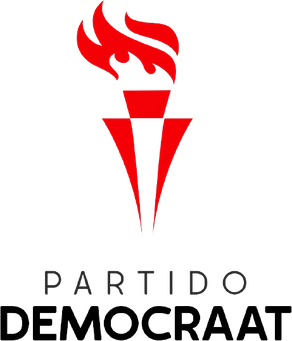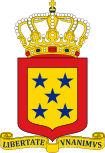
The Netherlands Antilles, also known as the Dutch Antilles, was a constituent Caribbean country of the Kingdom of the Netherlands consisting of the islands of Saba, Sint Eustatius, and Sint Maarten in the Lesser Antilles, and Aruba, Curaçao, and Bonaire in the Leeward Antilles. The country came into being in 1954 as the autonomous successor of the Dutch colony of Curaçao and Dependencies, and it was dissolved in 2010, when like Aruba in 1986, Sint Maarten and Curaçao gained status of constituent countries within the Kingdom of the Netherlands, and Saba, Sint Eustatius, and Bonaire gained status of special municipality of Netherlands as the Caribbean Netherlands. The neighboring Dutch colony of Surinam in continental South America, did not become part of the Netherlands Antilles but became a separate autonomous country in 1954. All the territories that belonged to the Netherlands Antilles remain part of the kingdom today, although the legal status of each differs. As a group they are still commonly called the Dutch Caribbean, regardless of their legal status. People from this former territory continue to be called Antilleans in the Netherlands.

The Democratic Party is a liberal party in Curaçao founded in 1944. The party has participated in elections for the Estates of the Netherlands Antilles and the Island Council of Curaçao until the dissolution of the Netherlands Antilles in 2010, obtaining a single seat in the island council in 2007.
The music of the former Netherlands Antilles is a mixture of native, African and European elements, and is closely connected with trends from neighboring countries such as Venezuela and Colombia and islands such as Puerto Rico, Cuba, Santo Domingo, Haiti, Martinique, Trinidad, Dominica, and Guadeloupe. The former Netherlands Antilles islands of Curaçao and Aruba are known for their typical waltzes, danzas, mazurkas and a kind of music called tumba, which is named after the conga drums that accompany it.

The Netherlands Antilles national football team was the national team of the former Netherlands Antilles from 1958 to 2010. It was controlled by the Nederlands Antilliaanse Voetbal Unie. The NAVU consisted of Curaçao and Bonaire. Aruba split in 1986 and has its own team.
Elections in the Netherlands Antilles were held for two territorial levels of government: the state, and the island territories.

The Netherlands Antillean guilder is the currency of Curaçao and Sint Maarten, which until 2010 formed the Netherlands Antilles along with Bonaire, Saba, and Sint Eustatius. It is subdivided into 100 cents. The guilder was replaced on 1 January 2011 on the islands of Bonaire, Saba and Sint Eustatius by the United States dollar.

Sint Maarten is a constituent country of the Kingdom of the Netherlands in the Caribbean region of North America. With a population of 58,477 as of June 2023 on an area of 34 km2 (13 sq mi), it encompasses the southern 44% of the divided island of Saint Martin, while the northern 56% of the island constitutes the French overseas collectivity of Saint Martin. Sint Maarten's capital is Philipsburg. Collectively, Sint Maarten and the other Dutch islands in the Caribbean are often called the Dutch Caribbean.

The Charter for the Kingdom of the Netherlands is a legal instrument that sets out the political relationship among the four countries that constitute the Kingdom of the Netherlands: Aruba, Curaçao, Sint Maarten in the Caribbean and the Netherlands in Europe. It is the leading legal document of the Kingdom. The Constitution of the Netherlands and the Basic Laws of the three other countries are legally subordinate to the Charter.

The Netherlands Antilles was an autonomous Caribbean country within the Kingdom of the Netherlands. It was dissolved on 10 October 2010.
The country code 599 was assigned to the Netherlands Antilles, and is in use by Curaçao and the Caribbean Netherlands.

The following outline is provided as an overview of and topical guide to the Netherlands Antilles:

The Kingdom of the Netherlands, commonly known simply as the Netherlands, is a sovereign state consisting of a collection of constituent territories united under the monarch of the Netherlands, who functions as head of state. The realm is not a federation; it is a unitary monarchy with its largest subdivision, the eponymous Netherlands, predominantly located in Northwestern Europe and with several smaller island territories located in the Caribbean.
A constitutional referendum was held in Bonaire on 17 December 2010. The new constitution would make the island a municipality within the Netherlands. Although the results showed 88% had voted against the new status, the referendum had required a 51% turnout and was subsequently declared invalid as the actual turnout was only 35%.

Gerrit Fransisco Schotte is a Curaçaoan politician, and the current leader of the Movementu Futuro Kòrsou (MFK). In the Curaçao general election of 27 August 2010, the MFK became the second-largest party with 5 seats in the Island Council. MFK formed an island government together with Pueblo Soberano and Partido MAN on 4 September. This coalition became the first Cabinet of Curaçao when the Netherlands Antilles was dismantled on 10 October 2010. Schotte at that point became the first Prime Minister of Curaçao.

Sint Maarten, a constituent country of the Kingdom of the Netherlands, has a government formed by the monarch, represented by the governor, and the ministers. The Prime Minister of Sint Maarten presides over the council of ministers. Executive power is exercised by the government. Legislative power is vested in both the government and parliament. The minister plenipotentiary is not part of the government and represents the Sint Maarten government in the Netherlands. The judiciary is independent of the executive and the legislature. The country is a parliamentary representative democratic country with a multi-party system. Sint Maarten has full autonomy on most matters, with the exceptions summed up in the Charter for the Kingdom of the Netherlands under the title "Kingdom affairs". The Constitution of Sint Maarten was ratified in September 2010, and entered into force on 10 October 2010.
The Caribbean guilder is a planned currency of Curaçao and Sint Maarten, two constituent countries of the Kingdom of the Netherlands, officially slated for introduction in 2025. It is divided into 100 cents. The Caribbean guilder is set to replace the Netherlands Antillean guilder (ANG) at par and be pegged to the U.S. dollar. The currency has an official launch scheduled for 31 March 2025 and will become the sole legal tender in the countries after 30 June 2025.

The Dutch Caribbean are the New World territories, colonies, and countries of the Dutch Empire and the Kingdom of the Netherlands located in the Caribbean Sea, mainly the northern and southwestern regions of the Lesser Antilles archipelago.
This article lists some of the events that took place in the Netherlands in 2010.

Dominico Felipe "Don" Martina is a Curaçaoan politician. He served two terms as Prime Minister of the Netherlands Antilles. His first term lasted from November 1979 to October 1984 and his second term from January 1986 to July 1988.
Same-sex marriage has been legal in Bonaire, Sint Eustatius and Saba since 10 October 2012, the effective date of legislation passed by the States General of the Netherlands enabling same-sex couples to marry. The Caribbean Netherlands was the first jurisdiction in the Caribbean to legalise same-sex marriage, and was followed a few months later by French territories, including Guadeloupe and Martinique, in May 2013.











